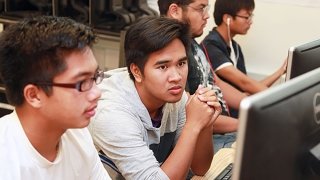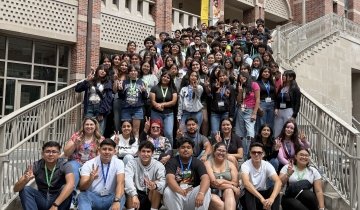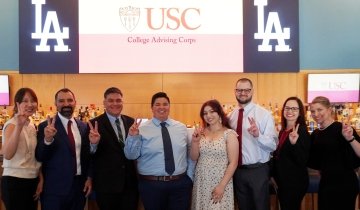Despite widespread agreement and years of research on students’ use of technology, there has been little change in the numbers of students qualified to pursue tech related majors and careers. This is the case even when districts adopt programs designed to address these problems.
In order to study such problems, the USC Rossier School of Education is launching the Center for Empowered Learning and Development with Technology. CELDT will also work to design solutions for the leaky “tech pipeline” for students of color.
Associate Professor of Education and Psychology Brendesha Tynes will lead the center.
“Brendesha leads the field in research that explores the nexus of technology, students and race,” says USC Rossier Dean Karen Symms Gallagher. “Schools and society are only moving toward increased use of technology, and understanding the technological and cultural implications of the barriers still faced by a large segment of our student population will ensure greater digital equity for all.”
Based on her existing projects, Tynes argues “teachers and researchers have to know something about both learning and development when integrating technology.” In addition, “we need deep knowledge and training in underrepresented students’ cultures, histories and the systemic ways race operates across school campuses.”
Tynes has pulled together a team of researchers with expertise that range from developmental and educational psychology to computer and information science. Her teams also include scholars in the humanities, as is the case with CRITmetic, an online intervention that will train 8th-10th graders to critique material on the Internet, particularly related to race.
“Schools and universities across the country are trying to figure how we avoid what happened in the 2016 election with fake news outpacing mainstream news sites. We plan to take a unique approach that considers student development in the design,” Tynes says.
USC Provost Postdoctoral Scholar Stephen Aguilar will join Tynes as the associate director of the center. Together they have designed a robust research agenda that includes utilizing big data in education to personalize the educational experience of students of color in a culturally relevant way. Affiliated faculty from across the University of Southern California will join them in their efforts to make digital equity a reality.
The center begins operations in the first week of October 2017. Launch week activities will include an introduction to the center’s research agenda on Monday, Oct. 2 and a talk on Thursday, Oct. 5 by Columbia University professor and visiting Harvard fellow Desmond Patton.





